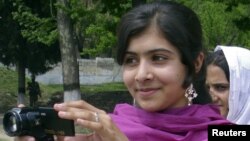ISLAMABAD —
Pakistanis are reacting with shock to the shooting of a teenage activist. A girl shot in the head by the Taliban for her “western” ideals remains in critical condition.
By Wednesday, a team of Pakistani doctors had removed a bullet from Malala Yousafzai, but Pakistani President Asif Ali Zardari vowed to send the 14-year-old girl abroad if doctors in Pakistan recommended moving her.
Interior Minister Rehman Malik said Wednesday Yousafzai was in stable but critical condition.
[He later said the Taliban gunman who shot Yousafzai has been identified and will soon be arrested.]
The daylight attack shocked the country. Yousafzai, a young Muslim student, gained international and national fame for a blog documenting Taliban atrocities while her hometown in the northwestern area of Swat Valley was under the militants’ control in 2008-2009. She remains an outspoken supporter of girls' education and rights.
Wednesday, hundreds of people rallied in Islamabad in support of the teenage activist. Political and religious leaders, students and teachers across Pakistan swiftly condemned the shooting.
University student and fellow Swat Valley resident Jawadullah Khan expressed his disgust. “The attack on Malala was a coward’s act," he said, "because she was advocating for girls and education in Swat. It is an attack on Pakistan’s youth,” Khan stated.
Taliban leaders claimed the assassination attempt in northwest Pakistan was in response to Yousafzai’s “pro-West” ideology, her speaking out against the Taliban, and calling U.S. President Barack Obama her idol.
The attack was front page news across Pakistan on Wednesday, with one English daily giving it the headline “Hate Targets Hope” and another newspaper describing Yousafzai as a “peace icon”.
Local TV channels also dedicated much of their coverage to the case, showing pictures of the young girl surrounded by doctors with a bandage wrapped around her head.
International Crisis Group analyst Samina Ahmed says the government’s inability to rein in militant groups was resulting in a spread of violent extremist attacks across the country, the most recent being that of Yousafzai.
“Unless the weight of the law is thrown at these violent extremists, unless the state takes action, and it has to be across the board, then these groups will become far more dangerous, even more dangerous than they are now,” Ahmed added.
The Taliban led a violent campaign of control of the Swat area in 2008-2009, marked by beheadings and attacks on girls’ schools. It was that violence that then 11-year old Yousafzai wrote about in her blog published by the BBC under the pen name of Gul Makai.
Pakistan’s military in 2009 pushed the Taliban out of Swat. But militants have been returning to the region and further west, close to the Afghan border.
Yousafzai won Pakistan’s National Peace Award in 2011, and was nominated for the prestigious International Children's Peace Prize.
By Wednesday, a team of Pakistani doctors had removed a bullet from Malala Yousafzai, but Pakistani President Asif Ali Zardari vowed to send the 14-year-old girl abroad if doctors in Pakistan recommended moving her.
Interior Minister Rehman Malik said Wednesday Yousafzai was in stable but critical condition.
[He later said the Taliban gunman who shot Yousafzai has been identified and will soon be arrested.]
The daylight attack shocked the country. Yousafzai, a young Muslim student, gained international and national fame for a blog documenting Taliban atrocities while her hometown in the northwestern area of Swat Valley was under the militants’ control in 2008-2009. She remains an outspoken supporter of girls' education and rights.
Wednesday, hundreds of people rallied in Islamabad in support of the teenage activist. Political and religious leaders, students and teachers across Pakistan swiftly condemned the shooting.
University student and fellow Swat Valley resident Jawadullah Khan expressed his disgust. “The attack on Malala was a coward’s act," he said, "because she was advocating for girls and education in Swat. It is an attack on Pakistan’s youth,” Khan stated.
Taliban leaders claimed the assassination attempt in northwest Pakistan was in response to Yousafzai’s “pro-West” ideology, her speaking out against the Taliban, and calling U.S. President Barack Obama her idol.
The attack was front page news across Pakistan on Wednesday, with one English daily giving it the headline “Hate Targets Hope” and another newspaper describing Yousafzai as a “peace icon”.
Local TV channels also dedicated much of their coverage to the case, showing pictures of the young girl surrounded by doctors with a bandage wrapped around her head.
International Crisis Group analyst Samina Ahmed says the government’s inability to rein in militant groups was resulting in a spread of violent extremist attacks across the country, the most recent being that of Yousafzai.
“Unless the weight of the law is thrown at these violent extremists, unless the state takes action, and it has to be across the board, then these groups will become far more dangerous, even more dangerous than they are now,” Ahmed added.
The Taliban led a violent campaign of control of the Swat area in 2008-2009, marked by beheadings and attacks on girls’ schools. It was that violence that then 11-year old Yousafzai wrote about in her blog published by the BBC under the pen name of Gul Makai.
Pakistan’s military in 2009 pushed the Taliban out of Swat. But militants have been returning to the region and further west, close to the Afghan border.
Yousafzai won Pakistan’s National Peace Award in 2011, and was nominated for the prestigious International Children's Peace Prize.





